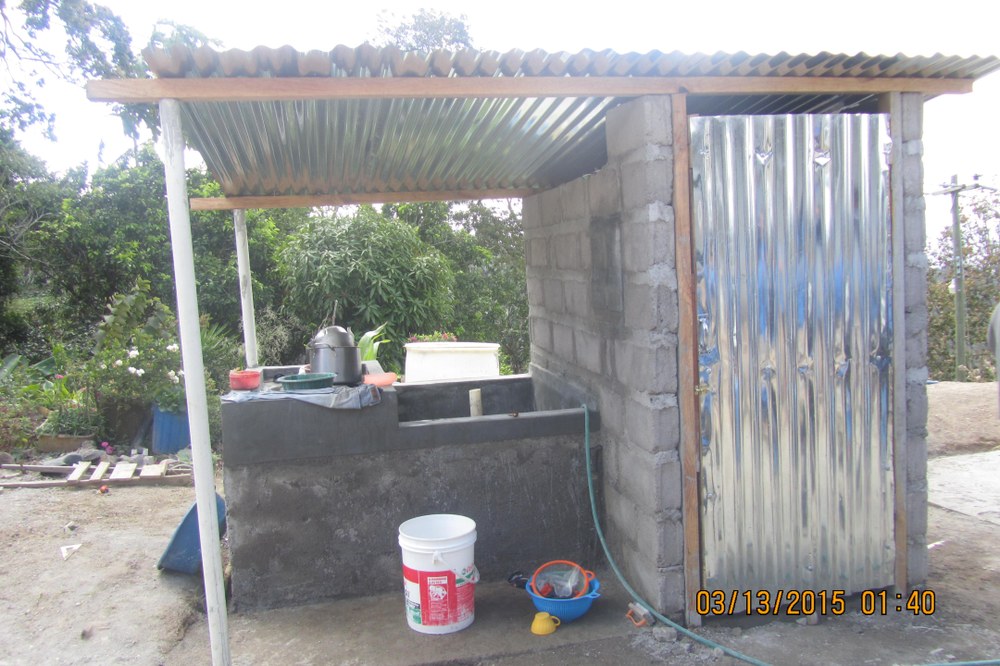Posted: October 8, 2015
No longer is my travel what others can learn from me, but is about what I can learn from others.

The hygiene station after it was finally finished!
According to Webster's Dictionary, the definition of volunteer is "a person who voluntarily offers himself or herself for a service." Reading that, I felt like it was a very ambiguous way to define a powerful word. Volunteering is so much more that, and in March of 2015, I had the opportunity to voluntarily offer myself for a service for the second time in a small village called Buena Vista in the mountains of Honduras.
Unfortunately, volunteering can get a bad rep and if fueled by negative intentions, can actually do more harm than good. As a volunteer for Global Brigades, it is not only our duty to protect the name of the organization we are representing, but we are taught to respect the language, culture, religion and stage of development the community is in.
While traveling with Global Brigades this March, I worked with a local family to build five cement floors, an eco-stove and a hygiene station, all with the resources that they have. For four days, we hand mixed (what felt like 100 batches) of cement, leveled floors, carried bricks and built walls--never without the family members, though. Every morning and every afternoon, Daliah, the mother, was working along side of us, helping carry bricks, giving us advice and hydrating us with coffee--lots of coffee. Each project that we worked on was developed by Honduran students studying at local universities who understand the nature of that area and what resources they have access to.
Out of anything I have learned in any of my classes or other experiences abroad is the nature of sustainability. Yes, I know, what an overused word, but I believe when it comes to the realm of rural development work, it is the most underused and underutilized concept. Why go into a community and build something that will not last? Shouldn't we be building projects that help communities for years to come? Shouldn't these projects sustain these members who have graciously accepted us into their homes?
As a volunteer in a rural area in Central America, I had two goals while I was abroad. The first is to see how our projects were making a positive impact in the community's life both in the short term and long term. For this trip, building a hygiene station allows our family to have access to water for washing clothes and dishes, as well as privacy for showering and using the toilet. These are basic essentials that, as Americans, many of us could not do without. The eco-stove was another project that will have a major impact in the livelihood of these families. Many cook with an open fire in a small room where the smoke gets trapped and can cause serious health impacts. The eco-stove creates a ventilation system that directs the smoke out the house. On top of immediately reducing their risk of lung disease, the eco-stove is more efficient and will decrease the number of trees that are being cut down to cook with. After four short days, I could see how moved Daliah and her family had been by simple fixes that would sustain her family for years to come.
The second goal I have is to always learn what I can from the members of the community. My first experience with Global Brigades to Panama was life changing. This time, though, boarding the plane, I had a much better idea what to expect, so I prepared myself a list of questions that I could ask Honduran people. While sitting in our compound reading one night, our translator, Raul, who is a native to Honduras, sat down next to me. I instantly pulled out my list of question and started firing away. "What do Honduran's think of Americans coming down to "help" them?" "Is this perceived negatively?" "How do you feel about Honduras and the fact that San Pedro Sula is the murder capital of the world?" All of these things were eating away at me. I couldn't help but ask them and get the true perspective of volunteering in an underdeveloped area of Honduras. Raul's answers were simple and frank. Hondurans are proud to live in such a beautiful country. Raul had great pride in being able to share the history of a country that he has loved growing up in. He assured me that by being culturally appropriate, the work we are doing is going to impact the lives of Daliah and her family forever.
My time spent in Honduras will never be forgotten. No longer is my travel what others can learn from me, but is about what I can learn from others. Daliah, Raul and the other Hondurans that I met have touched my heart and I will never forget the experience.
Ag Sciences Global
Address
106 Agricultural Administration BuildingUniversity Park, PA 16802
- Email globalag@psu.edu
- Office 814-863-0249
- Fax 814-865-3055
Ag Sciences Global
Address
106 Agricultural Administration BuildingUniversity Park, PA 16802
- Email globalag@psu.edu
- Office 814-863-0249
- Fax 814-865-3055

